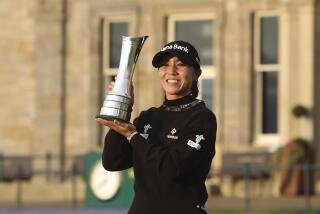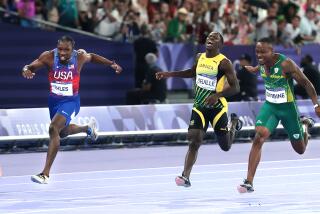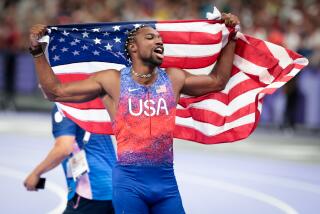Sandy Lyle Is Britain’s Champion
SANDWICH, England — Forget about ruling the waves. That’s ancient history. And so is the Empire upon which the sun would never set.
But Britain, once again, has the British Open champion. And, in these times of diminished expectations, that will do.
Sandy Lyle, a Scot though born and bred in England, beat back the world to capture the Open championship before cheering thousands at Royal St. George’s Sunday.
Actually, the world cooperated mightily in the surprise victory, the first by a Briton in the Open since Tony Jacklin’s in 1969. A variety of leads were wasted, some in spectacular fashion, and Lyle, a non-winner this year and a constant disappointment to his fellow Britons, was there at the end despite a heart-stopping bogey at 18 when Lyle thought he had blown it all.
“I never even thought about winning until the last four or five holes,” said Lyle, who finished one stroke ahead of Payne Stewart. “When I birdied 15 (to take a share of the lead), I nearly burst into tears.”
He finished the round at even-par 70, the 72 holes at two-over-par 282 and then watched television in the championship committee room, waiting to see whether David Graham or Bernhard Langer could catch him.
When Langer’s chip on 18 skipped by the hole, assuring Lyle of the victory, Lyle’s wife, Christine, burst into tears. There were tears all over this island kingdom, from Glasgow to Wentworth.
The crowds cheered. BBC-TV positioned its cameras on the Union Jack atop the clubhouse. British reporters roared their approval. It wasn’t V-E day, but there was definitely a night of celebration ahead.
“He won’t believe how much of a hero he’ll be in Britain now,” fellow Brit golfer Philip Parkin said of Lyle. “It will be scary.”
It was scary on the links at Royal St. George’s on a gorgeous day when the sun finally shone and the winds, of course, continued to blow.
Stewart came from back in the pack to shoot a 68 and finish second at 283. Langer and Graham, who began the day as co-leaders at one-under-par, each shot 75s to finish in a four-way tie for third with Christy O’Connor and Mark O’Meara at 284.
Langer and Graham each bogeyed three of the first five holes, blowing their three-shot advantage and losing the lead to a charging Tom Kite.
“I felt I had the championship in my pocket at the turn,” said Kite, who led by two strokes at that point.
Instead, he turned in a double-bogey 6 on the 10th hole--including three chip shots from various fringes of the green--and needed 40 strokes to complete the back 9, finishing at 285.
The lead went back to Graham, who was ahead by two strokes after 14. He bogeyed three of the last four holes and left the course without saying anything.
Lyle, 26, his hair suitably sandy colored, a smile as wide as all Britain, had much to say. He talked about how as a youngster he was in the stands overlooking the 18th green at Royal Lytham when Jacklin won the Open. Jacklin tossed his ball in the air, not three feet, as it turns out, from where young Lyle sat.
“I thought then, it would be nice to be a golfer,” he said.
His father, a Scot, which is how Lyle came by his claim to Scotland, was a pro at Hawkstone Park near Shropshire in the English Midlands. Sandy spent his life on the golf course, and he dreamed of a moment like Jacklin’s on 18.
To get there, Lyle, after a bogey on 13, birdied 14 with a 45-foot putt from the fringe. On 15, he sank a 12-footer to move into a tie. Another Graham bogey gave him the lead as he headed for 18.
But Lyle’s 18 would be nothing like Jacklin’s.
First, a male streaker rushed across the green, only to be tackled by golfer Peter Jacobsen.
“He streaked into my line and I got a little hot, so I tackled him,” Jacobsen said. “I lowered my shoulder and hit him right here.”
He was pointing to a part of the anatomy somewhere below the stomach. The streaker was arrested and Lyle continued his pursuit of the championship.
“I thought I needed a 4 to win,” Lyle said.
His second shot went through the green and into the short rough behind it, a tough shot but hardly an impossible one. But, perhaps 40 feet from the hole and 6 feet from the green, Lyle knocked his chip all of 10 feet.
He sank to his knees, hammered his club into the turf, lowered his forehand to the ground and wondered if he had given it all away.
Said Lyle: “I thought to myself, ‘For Christ’s sake, don’t three-putt. Don’t blow it now. . . . Don’t take a 6 with 15 feet to go.’ ”
He didn’t. Lyle rolled his putt in close, got his bogey and started biting his nails.
Graham and Langer each strode to the 18th green a shot off the lead, needing a birdie on a hole that had not been birdied all day--and would not be.
Both hit good tee shots, but Langer put his iron shot into the rough right of the green. When Graham hit his approach shot, the crowd, as it does traditionally, closed in on the fairway, blocking Graham’s way as well as his view of the ball.
The crowd gave a loud cheer after Graham’s shot, and he then assumed it had landed on the green.
He took out his putter and began to search, but the ball was nowhere to be found. Finally, Graham asked where the ball had gone, and a thousand arms pointed to the bunker at the front right of the green.
Golf fans--gasp--had cheered a bad shot. That’s how important Lyle’s win was here.
Graham’s bunker shot stopped 15 feet from the hole, and the Australian-turned-Texan had to settle for a bogey instead of a chance for his third major. Langer’s chip headed toward the pin, lipped the hole, but bounded past, and he missed his chance at a second major.
Leaving Lyle. He has for some years been the British hope. A long driver with a decent touch around the greens, Lyle has been among the top five European golfers the last six years. This year, he has played regularly on the American tour with only middling results, his best finish a tie for 15th.
“He’s not very aggressive,” Parkin said of Lyle. “He looks as if he doesn’t care most of the time. Like, ‘Oh, very well, next week will do.’ ”
Just a month ago, he picked up on the 18th hole at the second round of the Irish Open on his way to what would have been a 94.
Nevertheless, he came to Royal St. George’s optimistic and hoping to make a good showing. Three strokes back beginning his round on Sunday, he knew he had a chance, but he knew that a lot of golfers were in contention.
Coming down 18, he began to feel what all this might mean. The crowd was cheering lustily as the soon-to-be hero walked by.
“It was fantastic,” he said. “You could cut the atmosphere with a knife. I got earaches in both ears. I was talking to my caddy, but he couldn’t hear me.”
The noise will follow Lyle wherever he goes now. The expectation will follow him, perhaps haunt him.
“I have large shoulders,” he said, smiling.
He became the third European to win one of the last five majors. Americans didn’t come here in force, and American superiority in the game remains under attack.
Stewart, who was in the clubhouse two hours before play ended, never wins anyway. He was very comfortable in second place. Last year, he won $288,000, the most money ever made by a non-winner.
Kite, who had his chance, has never won a major.
“The gap is getting smaller,” Lyle said.
But for Britain, none of that matters right now. There will always be an England, and for now, there is an England with an Open champion among its own.
More to Read
Go beyond the scoreboard
Get the latest on L.A.'s teams in the daily Sports Report newsletter.
You may occasionally receive promotional content from the Los Angeles Times.










